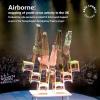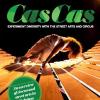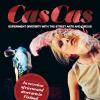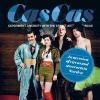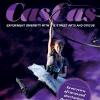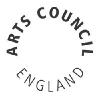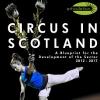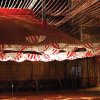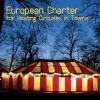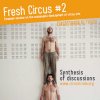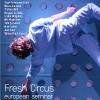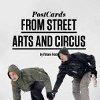Policy
Produced by the researcher Leila Jancovich on behalf of Arts Council England as part of the Young People’s Participatory Theatre project, the bulk of this document is the presentation of statistical data from a series of questionnaires and consultations targeting the UK youth circus sector. The report gives an idea of the geographic spread and demographic range of youth circus, the organisational structure of providers and their level of activity, and the funding and impact of the sector, among other things. The report makes a series of recommendations for actions to develop the sector.
CASCAS (Circus And Street Arts Come And See) was a European project to promote intercultural understanding and exchange. Between May 2010 and November 2011 it arranged four tours for four small groups of circus and street arts professionals in the project's partner countries (UK, Sweden, Finland and Belgium) as a way of introducing them to that country's conditions and working practices. As part of the project, four briefing documents were produced — short guides to the circus and street arts sectors in the partner countries that give a basic overview of government policy, key festivals and venues, example companies, etcetera.
CASCAS (Circus And Street Arts Come And See) was a European project to promote intercultural understanding and exchange. Between May 2010 and November 2011 it arranged four tours for four small groups of circus and street arts professionals in the project's partner countries (UK, Sweden, Finland and Belgium) as a way of introducing them to that country's conditions and working practices. As part of the project, four briefing documents were produced — short guides to the circus and street arts sectors in the partner countries that give a basic overview of government policy, key festivals and venues, example companies, etcetera.
CASCAS (Circus And Street Arts Come And See) was a European project to promote intercultural understanding and exchange. Between May 2010 and November 2011 it arranged four tours for four small groups of circus and street arts professionals in the project's partner countries (UK, Sweden, Finland and Belgium) as a way of introducing them to that country's conditions and working practices. As part of the project, four briefing documents were produced — short guides to the circus and street arts sectors in the partner countries that give a basic overview of government policy, key festivals and venues, example companies, etcetera.
CASCAS (Circus And Street Arts Come And See) was a European project to promote intercultural understanding and exchange. Between May 2010 and November 2011 it arranged four tours for four small groups of circus and street arts professionals in the project's partner countries (UK, Sweden, Finland and Belgium) as a way of introducing them to that country's conditions and working practices. As part of the project, four briefing documents were produced — short guides to the circus and street arts sectors in the partner countries that give a basic overview of government policy, key festivals and venues, example companies, etcetera.
Taking a check on the health of the circus sector (circa October 2006) in order to develop recommendations for its development, this document gives a brief overview of the nature of circus as a cross-disciplinary, physical artform before examining its existing infrastructure – venues, festivals, networks, audiences, legislation, etcetera.
A five-year development plan that looks at the current state and future needs of the artform, Circus in Scotland: A Blueprint for the Development of the Sector 2012 – 2017 has been produced and published by Articulation, Scotland's umbrella organisation for physical performance.
Published by the Czech contemporary circus centre Cirqueon, this document is an introduction to the various aspects of the CZ scene, covering a brief overview of the artform, government policy and levels of subvention, and operational models within the sector, as well as giving details on some key companies, festivals and organisations.
Summarising the information from a European seminar arranged in 2011 by Circostrada Network in partnership with the French national information centre for street arts and circus HorsLesMurs and the Dutch festival Circo Circolo, this publication gives an overview of the evolution of the European Capital of Cultures programme, suggests some ways in which circus and outdoor arts suit the priorities of the programme, and ends with a short series of recommendations to circus stakeholders, ECOC teams, and policymakers.
Developed by a large European working group, the European Circus Charter for Hosting Circuses in Towns lays out a model of good practice to which local authorities, circuses and other hosts can subscribe. It divides into four parts: How to host a circus?, Location, Installation, and Performance, colour coding its recommendations to distinguish between circus and local authority commitments.
Documenting the second Fresh Circus seminar, which took place 12-13 April 2012 at Parc de la Villette in Paris, this publication collects reports from the event's ten breakout working groups. The seminar's uniting theme was an exploration of the 'sustainable development' of circus arts, with sessions covering such subjects as artistic residencies, cultural journalism, cooperation with businesses, the role of new media in developing audiences, and the effect of globalisation on circus aesthetics.
Published by Circostrada, this report covers the activity at the first Fresh Circus, a European seminar bringing together 288 professionals from all corners of contemporary circus (producers, directors, artists, critics, policy-makers, etcetera). The different chapters of the document cover the various thematic working sessions that made-up the main part of the seminar.
One of the outputs of the CASCAS (Circus and Street Arts Come and See) project, which saw four groups of industry professionals tour the circus and street arts scenes in the UK, Sweden, Finland and Belgium, Postcards From Street Arts and Circus is a short, pamphlet-length book written by the researcher Yohann Floch, who accompanied the tours in all four countries.
Following on from, and building on, an earlier snapshot survey this 2002 Arts Council England document formulates a strategy for supporting the development of England's nascent circus sector. The report gives an overview of circus' status within the funding system before 2002, and makes a number of key recommendations to improve access in the future by improving knowledge/expertise within ACE itself.
An early piece of research from Arts Council England on the circus and street arts sectors, this document presents the results of an extensive survey that gathered information on: organisational status and staffing; size and source of income; network and organisation membership; performance activity and audiences; methods of promotion; education and outreach activity; and relationship with the funding system. Respondents were also invited to make suggestions for improvement.
